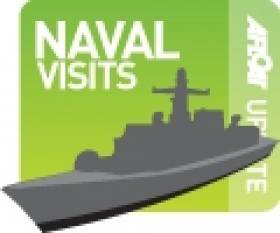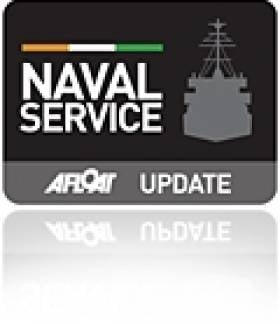Displaying items by tag: Naval Base
Lee Looks Ahead to All Antarès Arrival
A trio of French Naval mine-route survey craft are to sail upriver of the River Lee this Friday and are to berth in the Port of Cork at the North Custom House Quay, writes Jehan Ashmore.
The craft BRS Antarès (M 770), BRS Altaïr (M 771) and BRS Aldébaran (M 772) represent all of the three-ship Antarès-class which are based in the Breton naval base of Brest. At 28m long the rather stout-looking craft (photo) weigh some 250 tonnes displacement and have a crew of 23.
Leadship of the class BRS Antarès entered service in 1993 and was followed by the remaining pair which too were built by Chantier (Socarenam) in Boulogne-sur-Mer.
In March the BRS Altaïr accompanied the minehunter CMT Cassiopée (M642) to Dublin for a four-day visit during the St. Patrick's Day festival.
Navy Escort Detained Trawler to Castletownbere
Less then a month ago the Naval Service detained a Northern Irish registered fishing vessel the Lynn Marie seven miles east off Bray Head. Onboard was a crew of 4 UK nationals who were taken into custody to the Gardai after the trawler was escorted by the CPV L.E. Orla to Dun Laoghaire Harbour. To read more about this detention click here.
Ironically the L.E. Orla was a former Royal Naval vessel, HMS Swift (P241) which was deployed on her first assignment to the Hong Kong Patrol Squadron for a four-year period. In 1988 Margaret Thatcher's Conservative Party Government disposed HMS Swift and HMS Swallow (P242) to the Irish Naval Service. The pair were built by Hall Russell Shipyard of Aberdeen as part of an eight 'Peacock' class coastal patrol vessel (CPV).
The 'Peacock' pair were commissioned into the Naval Service and renamed L.E. Orla (P41) and L.E. Ciara (P42) in a ceremony attended by An Taoiseach Charles J. Haughey at the Naval Base in Haulbowline, Cork Harbour.
This weeks' detention is the second conducted by the Naval Service in 2011. Last year the Naval Service carried out 1,666 vessel boardings which resulted in 70 warnings and eight detentions.
- Irish Naval Service
- Cork Harbour
- Northern Ireland
- Haulbowline
- castletownbere
- naval service
- LE Niamh
- Royal Navy
- Ports and Shipping News
- Lynn Marie
- Fishery Breaches
- Fishery Detention
- Fishing Trawler
- Peacock Class
- Hong Kong
- Hall Russell
- Appledore Shipbuilders
- LE Orla
- HMS Swift
- LE Ciara
- HMS Swallow
- Margaret Thatcher
- Conservative Party
- An Taoiseach
- Charles J. Haughey
- Naval Base

























































